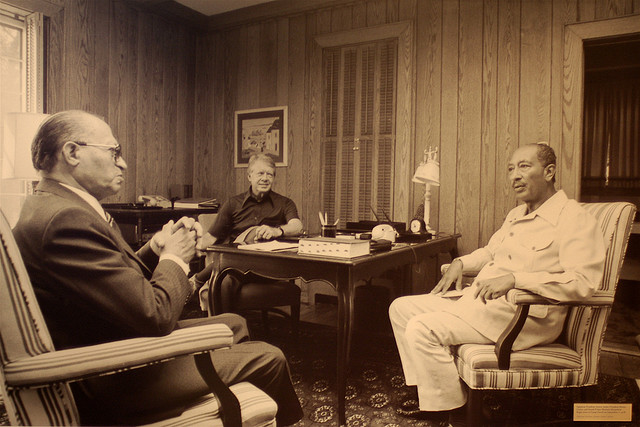Shakespeare would be overwhelmed. When the history of the 21st century is written, the tragedy that befell the Middle East at the start of the Millennium will be judged unprecedented. A conflict that has raged since the births of Zionism and the Palestinian national movement could have been mitigated. Unfortunately, fear and short-sighted leadership undermined that hope.
Let’s go back to 2007, a mere five years ago, but a very different time politically. It was still possible to consider a two-state resolution in Israel-Palestine. Arab leaders felt relatively secure in their long-held dictatorial rule. The leadership of the Palestinian Authority was cowed and willing to offer huge compromises to bring something back to their people. They had concluded that they couldn’t remain in leadership and also continue circular and fruitless negotiations with an Israel that was expanding its settlements every day.
The Prime Minister at the time was Ehud Olmert. He was still reeling from the war in Lebanon the previous year, which resulted in far more Israeli casualties than the public was accustomed to, and which had once again devastated southern Lebanon. The world, outside of the United States, was not looking kindly on Israel, and Israelis felt their “deterrent” power had been eroded. These are conditions that are ripe for a peace agreement.
Two other things were needed. One did not materialize – strong US backing for an agreement. The other did – an opportunity for a dramatic game-changer on the diplomatic front.
As it has now been revealed, Hosni Mubarak spearheaded an initiative to invite Olmert to address the Arab League, and begin a process aimed at a regional peace agreement based on the principles in the “Saudi Plan.” That plan offered Israel not only peace, but full, normal relations with every member of the Arab League in exchange for an Israeli withdrawal from the territories captured in 1967, and an agreed-upon solution of the refugee problem based on UN resolution 194.
These were not iron-clad conditions (no doubt, Israel would have balked at a complete withdrawal from the Old City of Jerusalem under the very best of circumstances.) However as a framework, it allows for negotiations and follows precisely the international consensus. That consensus has never been accepted by Israel, but it formed the understanding that underlay all negotiations for the past two decades, and is official policy of all western states, even the US, though that does not materialize in practice.
Had Olmert accepted this invitation, it would have been a political earthquake, at least as big as the one Anwar Sadat set off when he accepted the opportunity to address the Israeli Knesset in 1977. That decision by Sadat has led to three decades of peace between Israel and Egypt, once Israel’s chief foe in the region. The peace may not have been all Sadat had hoped, but it has held, with massive benefits to both countries, and it continues to endure despite the changes in Egypt and the attempts by both militants in the Sinai Peninsula and skeptics in Israel, and among its supporters, to strain it.
The Palestinians were on board, the Arab leadership was on board and the Bush Administration seems to have been uninvolved. It was up to Olmert. And Olmert politely declined.
The loss here is unimaginable. Akiva Eldar, who broke the story in Ha’aretz, tells us: “Olmert’s advisor Yaakov Galanti confirmed that the meeting with (former Knesset Member Dalia) Rabin and (former Minister Moshe) Shahal had taken place in March 2007, adding that ‘for a variety of reasons, which we cannot disclose, it was decided to continue with negotiations within the Annapolis framework without convening yet another international conference.'”

Olmert, worried about his standing in the polls, preferred to pursue the Bush Administration’s pointless Annapolis conference later that year. The idea, however, that Olmert was actually pursuing a “Palestinian front” instead of a regional approach was belied the following year by Olmert’s Foreign Minister, Tzipi Livni, who, when confronted with massive concessions by the Palestinians on both East Jerusalem and refugees, which were packaged with a land swap idea that would have left the major Israeli settlement blocs standing, said that even these “fail(ed) to meet our demands.”
Olmert might one day look at back at this decision and realize this was his chance to go down in history next to Yitzhak Rabin as a great peacemaker, no matter what the reality of each man’s performance might actually have been. Instead, true to form, Olmert remained the venal politician who came into the Prime Minister’s office primarily because his predecessor, Ariel Sharon, lapsed into a coma in which he remains to this day. And ever since, the Saudi Plan has drifted into the dustbin of history, though the proposal has never been officially withdrawn.
More than anything else, the revelation of the opportunity that Olmert ignored demonstrates that the problem on the Israeli side is not just the current, radically right-wing government, but something much more basic throughout Israeli politics. It’s the political fear of peace, and, perhaps, a physical one as well. One need look no farther than Rabin to realize that the fate Sadat met is a threat in Israel as well.
The current Prime Minister, Benjamin Netanyahu, makes an easy target for anyone remotely interested in peace. Unlike Olmert, he makes no pretense towards being open to ending Israel’s occupation of Palestinian lands. Netanyahu is just more brazen in his obstructionism than his predecessors.
We all love to beat up on Bibi, and I’m certainly no exception. But the death of the two-state solution, and the dearth of any recent efforts toward resolving the conflict, are just as much Olmert’s doing as Bibi’s. Indeed, after these new revelations, one might argue, perhaps more so.
But even Olmert wasn’t solely to blame in his day. In the US, the “pro-Israel” community, Jewish or otherwise, proved itself again to be anything but that, as it repeatedly cast a suspicious eye on the Saudi plan, with some elements even claiming that it demanded Israel agree to a full right of return for Palestinian refugees (it did nothing of the kind, either in letter or spirit.) The voices calling for legitimate negotiations were small, weak and shouted down by advocates for a status quo where Israel must eternally live by the sword, and Palestinians can live or die under occupation.
The Bush Administration was, at best, indifferent to the Saudi Plan. In Israel, the so-called mainstream peace camp ignored it almost as thoroughly as Sharon had dismissed it, when Ryadh’s framework was first presented in 2002. There were no loud Israeli or Diaspora Jewish calls to take the chance the Arab League had put forward, or even, more cynically, to call the Arab states on their bluff. Indeed, the fact that it was just ignored, rather than roundly denounced, shows that these quarters knew it was a serious opportunity for peace…a peace in which they had little interest.
The naysayers can always point to Palestinian divisions, the corruption of the Palestinian Authority, violence from Hamas or other, smaller Palestinian bands as to why there is no hope for peace now. Those are all obstacles, and there are others which are not the fault of Israel or Israel’s supporters. But the revelations about Olmert’s declining a dramatic opportunity for peace show very clearly the lack of will on the Israeli side for peace. The olive branch was stretched out, and Israel politely declined, preferring to live by the sword. It wasn’t the first time. Unless something changes in Israel or the United States, it won’t be the last.
Photographs courtesy of Jeff Kubina (#1) and Rahel Sharon (#2.) Published under a Creative Commons license.





